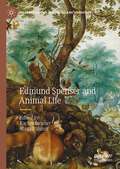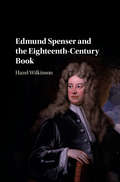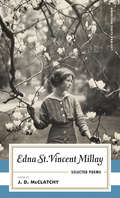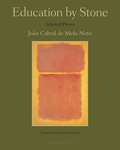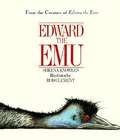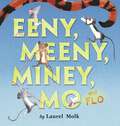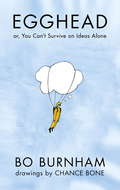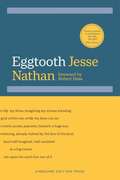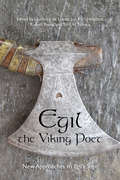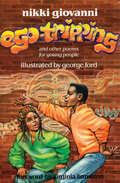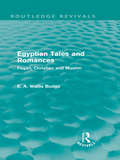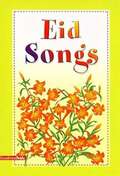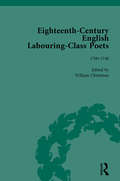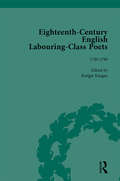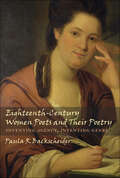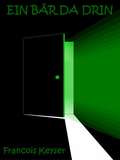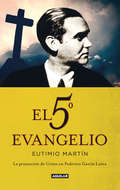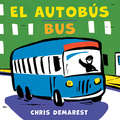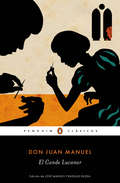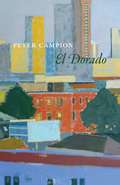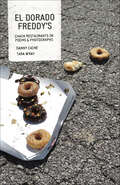- Table View
- List View
Edmund Spenser and Animal Life (Palgrave Studies in Animals and Literature)
by Abigail Shinn Rachel StennerThis book is the first extended critical study of the early modern poet Edmund Spenser from the perspective of animal studies. With an introduction situating Spenser in current discussions of animal life and literary form, and early modern animal studies, the book proceeds in four sections: “Animals and Cultural Practices”; “Animals, Slavery, and Race”; “Animals in Complaints”; “Readers and Poetics in The Faerie Queene”. Contributors discuss a broad range of Spenser’s work, putting it into dialogue with a number of early modern discourses, including politics, poetics, and natural history.
Edmund Spenser and the Eighteenth-Century Book
by Hazel WilkinsonEdmund Spenser's epic poem The Faerie Queene (1590-96) occupied an important place in eighteenth-century culture. Spenser influenced almost every major writer of the century, from Alexander Pope to William Wordsworth. What was it like to read Spenser in the eighteenth century? Who made Spenserian books, and how did their owners use and interpret them? The first comprehensive study of all of the eighteenth-century editions of Edmund Spenser addresses these questions through bibliographical analysis, and through examination of the history of the book and of eighteenth-century literature and culture. Within these contexts, Hazel Wilkinson provides new information about the production, contents, texts, and reception of the eighteenth-century editions of Spenser, to illuminate how his cultural presence became so far-reaching. With each chapter structured around a major edition of Spenser's work, this volume provides a timely addition to arguments about the nature of literary history and the growing cult of great writers of the past.
Edna St. Vincent Millay: Selected Poems
by J. D. McClatchy Edna St. MillayThe Selected Poetry of Edna St. Vincent Millay is a collection of some of her most loved poems. Brought together in this volume are the individual works of Renascence and Other Poems, A Few Figs From Thistles, Second April, and The Ballad of the Harp-Weaver.
Education by Stone
by Joao Cabral de Melo Neto Richard ZenithImagine making poems the way an architect designs buildings or an engineer builds bridges. Such was the ambition of João Cabral de Melo Neto. Though a great admirer of the thing-rich poetries of Francis Ponge and of Marianne Moore, what interested him even more, as he remarked in his acceptance speech for the 1992 Neustadt International Prize for Literature, was "the exploration of the materiality of words," the "rigorous construction of (. . .) lucid objects of language." His poetry, hard as stone and light as air, is like no other.
Edward The Emu
by Sheena KnowlesEdward the emu was sick of the zoo, There was nowhere to go, there was nothing to do, And compared to the seals that lived right next door, Well being an emu was frankly a bore. Tired of his life as an emu, Edward decides to try being something else for a change. He tries swimming with the seals. He spends a day lounging with the lions. He even does a stint slithering with the snakes. But Edward soon discovers that being an emu may be the best thing after all. And so he returns to his pen, only to find a big surprise awaiting him. . . . Edward is tired of being an emu, so he decides to try being something else for a change. First he spends some time swimming with the seals. Next, he lounges with the lions. He even slithers with the snakes. But Edward soon discovers that being an emu may not be so bad after all. So he heads back to his pen, only to find a big surprise awaiting him . . . Sheena Knowles' upbeat, rhyming text and Rod Clement's deliciously droll illustrations are sure to make readers laugh out loud in this whimsical picture book by the creators of Edwina the Emu. "If you buy one book. . . for sheer fun, there's no question it should be this one. " San Diego Union Tribune
Eeny, Meeny, Miney, Mo, and FLO!
by Laurel MolkThe mission: catch a tiger by the toe.The team: brothers Eeny, Meeny, Miney,and Mo. But what about little sister Flo? Can’t she help, too?Join these mischievous mice for a rollicking twist on a familiar nursery rhyme.Just be sure to watch your toes!
Egghead: Or, You Can't Survive On Ideas Alone
by Bo BurnhamIn 2006, at the age of 16, Bo Burnham posted videos he’d made of himself performing two songs about teenage angst on YouTube for his brother to watch. From this modest start, his YouTube videos with their unique blend of stand-up and music, now receive millions of views.
Eggtooth
by Jesse NathanIn this debut collection, Jesse Nathan matches an exquisite feeling for the music of lines and sentences with his profound explorations of the idea of home. The book's title comes from the word for a bit of cartilage on a baby bird's beak, a growth that helps it break out of the egg. Shortly after the bird hatches, the tooth disappears. Like an eggtooth, Nathan's poems are often figures for birth, for the violence of birth and, in his case, rebirth. They follow an unusual and passionate boy from his childhood on a wheat farm in the watershed of the Running Turkey Creek in rural southcentral Kansas ― "the land was always the solace" ― to his life years later in a coastal city.
Egil, the Viking Poet
by Russell Poole Laurence De Looze Jon Karl Helgason Torfi H. TuliniusEgil, the Viking Poet focuses on one of the best-known Icelandic sagas, that of the extraordinary hero Egil Skallagrimsson. Descended from a lineage of trolls, shape-shifters, and warriors, Egil's transformation from a precocious and murderous child into a raider, mercenary, litigant, landholder, and poet epitomizes the many facets of Viking legend.The contributors to this collection of essays approach Egil's story from a variety of perspectives, including psychology, philology, network theory, social history, and literary theory. Strikingly original, their essays will appeal not only to dedicated students of Old Norse-Icelandic literature but also to those working in the fields of Viking studies, comparative ethnology, and folklore.
Ego-Tripping and Other Poems for Young People
by Virginia Hamilton Nikki Giovanni George FordInsightful and fun, this collection of poetry captures the essence of the African American experience for young people.
Egyptian Colloquial Poetry in the Modern Arabic Canon
by Noha M. RadwanNoha Radwan offers the first book-length study of the emergence, context, and development of modern Egyptian colloquial poetry, recently used as a vehicle for communications in the revolutionary youth movement in Egypt on January 25th 2011, and situates it among modernist Arab poetry.
Egyptian Tales and Romances: Pagan, Christian and Muslim (Routledge Revivals)
by E. A. BudgeSir E. A. Wallis Budge (1857-1934) was Keeper of the British Museum’s department of oriental antiquities from 1894 until his retirement in 1924. Carrying out many missions to Egypt in search of ancient objects, Budge was hugely successful in collecting papyri, statues and other artefacts for the trustees of the British Museum: numbering into the thousands and of great cultural and historical significance. Budge published well over 100 monographs, which shaped the development of future scholarship and are still of great academic value today, dealing with subjects such as Egyptian religion, history and literature. First published in 1931, Egyptian Tales and Romances examines the historical and religious romances of the Egyptians from the early dynastic period to the twentieth century. Budge demonstrates Egypt’s transition from Paganism to Christianity, and finally to Islam, through tales and stories carefully transcribed and translated. Part I contains historical romances written on papyrus and stone, whilst parts II and III are derived largely from Coptic and Muslim manuscript sources. Including detailed illustrations and photographs, this fascinating classic work will be of interest to academics and students of Egyptian folklore, archaeology and history, as well as the general inquisitive reader.
Eid Songs
by Fawzia GillaniThis is a nice collection of songs, which will have special meaning for those who celebrate the Muslim holidays. "Thank Allah *** Hands to your ears, Hands by our sides, Turning to the Kabah, To Allah we pray. We thank Him for Eid, We thank Him for the day, We thank Him for everything He passes our way."
Eighteenth-Century English Labouring-Class Poets, vol 1
by John Goodridge Simon Kövesi David Fairer Tim Burke William ChristmasPoets of labouring class origin were published in Britain in the 18th and 19th centuries. Some were popular and important in their day but few are available today. This is a collection of some of those poems from the 18th century.
Eighteenth-Century English Labouring-Class Poets, vol 2
by John Goodridge Simon Kövesi David Fairer Tim Burke William ChristmasPoets of labouring class origin were published in Britain in the 18th and 19th centuries. Some were popular and important in their day but few are available today. This is a collection of some of those poems from the 18th century.
Eighteenth-Century Women Poets and Their Poetry: Inventing Agency, Inventing Genre
by Paula R. BackscheiderCo-Winner, James Russell Lowell Prize, Modern Language Association This major study offers a broad view of the writing and careers of eighteenth-century women poets, casting new light on the ways in which poetry was read and enjoyed, on changing poetic tastes in British culture, and on the development of many major poetic genres and traditions. Rather than presenting a chronological survey, Paula R. Backscheider explores the forms in which women wrote and the uses to which they put those forms. Considering more than forty women in relation to canonical male writers of the same era, she concludes that women wrote in all of the genres that men did but often adapted, revised, and even created new poetic kinds from traditional forms.Backscheider demonstrates that knowledge of these women's poetry is necessary for an accurate and nuanced literary history. Within chapters on important canonical and popular verse forms, she gives particular attention to such topics as women's use of religious poetry to express candid ideas about patriarchy and rape; the continuing evolution and important role of the supposedly antiquarian genre of the friendship poetry; same-sex desire in elegy by women as well as by men; and the status of Charlotte Smith as a key figure of the long eighteenth century, not only as a Romantic-era poet.
Eighteenth-Century Women Poets and Their Poetry: Inventing Agency, Inventing Genre
by Paula R. Backscheider“Our sense of eighteenth-century poetic territory is immeasurably expanded by [this] excellent historical and cultural” study of UK women poets of the era (Cynthia Wall, Studies in English Literature).This major work offers a broad view of the writing and careers of eighteenth-century women poets, casting new light on the ways in which poetry was read and enjoyed, on changing poetic tastes in British culture, and on the development of many major poetic genres and traditions.Rather than presenting a chronological survey, Paula R. Backscheider explores the forms in which women wrote and the uses to which they put those forms. Considering more than forty women in relation to canonical male writers of the same era, she concludes that women wrote in all of the genres that men did but often adapted, revised, and even created new poetic kinds from traditional forms.Backscheider demonstrates that knowledge of these women’s poetry is necessary for an accurate and nuanced literary history. Within chapters on important verse forms, she sheds light on such topics as women’s use of religious poetry to express ideas about patriarchy and rape; the important role of friendship poetry; same-sex desire in elegy by women as well as by men; and the status of Charlotte Smith as a key figure of the long eighteenth century, not only as a Romantic-era poet.Co-Winner, James Russell Lowell Prize, Modern Language Association
Ein Bär da drin
by Francois KeyserRick findet nach Einbruch der Dunkelheit einen Bären in seinem Haus und hat Angst. Seine Eltern können den Bären nicht finden und denken, dass er Alpträume hat. Aber der Bär ist echt. Die Frage ist jedoch, ist der Bär ein Freund oder ein Feind? "Ein Bär da drin" ist die Geschichte, die Kinder jede Nacht erleben. Es geht um die Angst der Kinder vor der Dunkelheit und um Monster im Dunkeln. Es soll den Kindern zeigen, dass sie nichts zu befürchten haben und dass das Spielzeug, das sie manchmal nach Einbruch der Dunkelheit fürchten, nicht wirklich beängstigend ist. Wir alle können uns auf unsere Kindheitsängste vor der Dunkelheit als Kinder oder Eltern beziehen. In Reimen geschrieben, liest sich diese Geschichte gut und sorgt für gutes Schauspiel und Geschichtenerzählen für Jugendliche, die ihnen helfen können, sich an die Geschichte zu erinnern und keine Angst vor der Dunkelheit zu haben.
Ekphrastic Medieval Visions
by Claire BarbettiExplores the transformative power of ekphrasis in high and late medieval dream visions and mystical visions. Demonstrates that medieval ekphrases reveal ekphrasis as a process rather than a genre and shows how it works with cultural memory to transform, shift, and revise composition.
El 5º evangelio: La proyección de Cristo en Federico García Lorca
by Eutimio MartínFederico García Lorca trató de restablecer el mensaje evangélico y para ello se propuso ofrecer en su obra un quinto evangelio. Los escritos juveniles del poeta granadino proyectan sobre la totalidad de su obra un marcado relieve de heterodoxia sociorreligiosa encaminada a la propagación de un humanismo mesiánico. El escritor Federico García Lorca se ha impuesto la ineludible responsabilidad de ofrecer, implícito en su obra, un nuevo evangelio. Eutimio Martín, catedrático emérito de la Universidad de Aix en Provence, realiza un amplio y profundo recorrido por la obra del universal escritor. Basándose en una sólida documentación, literaria y gráfica (a menudo desconocida y a veces inédita), analiza y comenta magistralmente textos en extremo crípticos, rescata al autor del asfixiante folclorismo en que se ha visto encerrado por una crítica miope o malintencionada, desvela la decisiva influencia de Victor Hugo, la impronta cervantina, el impacto de Antonio Machado y la radical aspiración al reconocimiento de una vertiente sexual a la que en modo alguno estaba dispuesto a renunciar porque en ello le iba la pérdida de su identidad. La abultada dimensión crística de la obra de Federico García Lorca puesta en evidencia por Eutimio Martín no dejará de suscitar una enriquecedora controversia.
El Amor, las Mujeres y la Vida
by Mario BenedettiEl amor, las mujeres y la vida reúne los mejores poemas de tema amoroso escritos por Mario Benedetti: tanto como decir uno de los poetas latinoamericanos más innovadores, frescos, divertidos, ambiciosos y modernos de la literatura en lengua española. De hecho, Mario Benedetti es uno de los escasos poetas actuales que han establecido contacto con el público lector. Sus libros se venden por miles de ejemplares y sus poemas se convierten en canciones o se quedan prendidos en la memoria de todos. La popularidad de Benedetti está en un nivel altísimo, sólo comparable a la de otros grandes poetas amados de todo el mundo: Alberti, Lorca, Machado, Neruda. Los jóvenes hacen cola para comprar sus libros, los mayores lo tienen por modelo admirable. Estos poemas demuestran, sobre todas las cosas, la fuerza de las mujeres y de ese antídoto de la muerte que ellas solas poseen: el amor. El CD que acompaña la publicación en papel de este ejemplar de El amor, las mujeres y la vida contiene una selección de los poemas efectuada por el propio autor. Es también Mario Benedetti quien los lee, dándoles el tono y la significación que nadie más podría darles.
El Autobús/Bus
by Chris Demarest Carlos CalvoBus rolls. Busy street. First stop, people meet. El autobús avanza. La calle está llena. En la primera parada, la gente espera. The big, colorful, noisy city comes to life in this deceptively simple rhyming book. Little listeners will be mesmerized by the rhythmic, rhyming ride—perfect reading for kids on a roll!
El Conde Lucanor
by Don Juan ManuelThis illustrated collection features the 51 stories of Count Lucanor, tales of bravery, deceit, romance, and other themes featuring characters from all walks of medieval Spanish life, including courtiers, farmers, and beggars. At the outset of each story, the Count poses a situation or dilemma to Patronio, his trusted advisor, who counsels his master using a short story with a moral. This carefully adapted edition will entertain adolescent readers as it introduces them to one of the great classics of Spanish literature. Esta colección ilustrada incluye los 51 cuentos del conde Lucanor, relatos de valentía, decepción, romance y otros temas en los que se destacan personajes de todos los ámbitos de la sociedad medieval española, incluyendo cortesanos, granjeros y mendigos. Al comienzo de cada cuento, el conde le plantea una situación o un dilema a Patronio, su consejero de confianza, quien aconseja a su amo usando cuentos cortos didácticos. Esta edición cuidadosamente adaptada entretendrá a los lectores adolescentes a la vez que les presenta uno de los grandes clásicos de la literatura castellana.
El Dorado
by Peter CampionIn El Dorado, Peter Campion explores what it feels like to live in America right now, at the beginning of the twenty-first century. Splicing cell-phone chatter with translations of ancient poems, jump-cutting from traditional to invented forms, and turning his high-res lens on everything from box stores to trout streams to airport lounges, Campion renders both personal and collective experience with capacious and subtle skill.
El Dorado Freddy's: Chain Restaurants in Poems & Photographs
by Danny Caine Tara WrayA charming and accessible collection of poems dedicated to one of the most American of inventions—fast food. &“I went back for seconds.&” —Dallas Crow, Rain Taxi Review of Books El Dorado Freddy&’s may be the first book of fast-food poetry. In poems like &“Olive Garden,&” &“Culver&’s,&” &“Popeye&’s Louisiana Kitchen,&” &“Cracker Barrel,&” &“Applebee&’s (after James Wright),&” Danny Caine—owner of the Raven Book Store in Lawrence, Kansas—&“reviews&” chain restaurants, bringing our attention to a slice of American life we often overlook, even though it&’s everywhere. Along the way, he touches on such topics as parenting, the Midwest, politics, and the pitfalls of nostalgia. Caine&’s wry, deceptively accomplished poems are paired with Tara Wray&’s color-drenched photos. The result is a literary yet goofy homage to American food and identity, set in a midwestern landscape dotted by the light of fast-food restaurants&’ glowing signs. Perfect for those readers who love both poetry and Popeye&’s. &“Caine&’s work has a tongue-firmly-planted-in-cheek appeal that is sly enough to fool the people who believe Popeye&’s chicken could be considered healthy, and funny enough to make the rest of us laugh, or groan, to ourselves. Wray&’s images in El Dorado Freddy&’s are understated in their Steven Shore-esque ability to capture the essence of a meal when we&’d rather not admit to, but cannot stop from embracing.&” —Cary Benbow, F-Stop Magazine
